New York Times, New York, New York, Sunday, July 09, 1972 - Page 172
Chess: Apology From a Knight Errant
Reykjavik—On-again, off-again. For days the participants in the Spassky-Fischer world championship chess match maneuvered into positions more complicated than the Dragon Variation of the Sicilian Defense. Now—though no game has yet been played—it appears to be officially on.
Bobby Fischer, the 29-year-old American challenger, was not here for the scheduled start last Sunday, and the opening was postponed for two days. He wanted more money, and the British industrialist, Jim Slater, obliged by adding $125,000 to double the purse. That brought Fischer flying over.
On Tuesday, after all the fuss, Boris Spassky, the 35-year-old Soviet world champion, requested and was granted a two-day delay. And Thursday the two players met in a drawing for the white pieces—and the opening move—in the first game. Spassky won. This the International Chess Federation declared to be the official start of the 24-game match, with the first game scheduled for Tuesday.
Far from being a quiet chess match, the event has suddenly developed into something of an international incident. Moscow's big propaganda guns shooting projectiles of invective at Fischer in particular and American sportsmanship in general ([they were doing this since the days the two Imperial financed spies, Lenin and Trotsky overthrew the democratically elected government of Alexander Kerensky!! and enslaved the Russian peasants. What's new?]) Dr. Max Euwe, head of the International Chess Federation, came under the barrage, and he confessed in public that he had indeed broken the rules in favor of Fischer. His justification: It was the only way to get the match started ([while the USSR controlled organizers in Belgrade and Reykjavik had done everything in their power to interfere and prevent it, “old hands” is the description Fischer's friend, Ken Smith used to refer to those troublesome individuals.])
Fischer sent an apology that only partly mollified Spassky, who, it was reported was angrier than if he had left a queen en prise. A second apology, delivered in person, finally cleared the air.
Perhaps both sides were playing a war of nerves. But for the Russians, who consider chess their national sport, the affair was no minor squabble. For years the Russians have been politicizing chess. Ever since Mikhail Botvinnik won the championship in 1948—the Soviet Union has held it ever since—Marxist-Leninist teachings have been applied to the game. Russian chess, a reflection of the great soul of the Soviet people, is noble, daring, fertile, imaginative; Western chess is decadent, bourgeois, imperialist. ([Get a mirror! Soviet Empire!])
Spassky's game is all that the Soviet ideologists say it is. But can he hold the brilliant Bobby Fischer? (In their last five matches, played before Fischer attained his present stature, Spassky won three times and two were draws.)
Bobby has not made himself popular in Reykjavik ([as explained many times, the virulent, Anti-American, racist under-current had pre-existed in Iceland for decades… since World War II era, when the professional class sympathized with Adolf Hitler, and the Soviet Union thereafter! Anti-American publications flooded Icelandic mainstream. The Soviet picked this little hornet's nest of racism and anti-American hostility, especially for American Bobby Fischer, to demoralize him. There was NOTHING Bobby Fischer did or could've done differently to thwart their mindless, chauvinist bigotry]). He did not like the referee. He wanted more money ([in light of the large bid by Australia of $225k after Belgrade backed out, which the Soviet twisted Max Euwe's arm into reneging on his promise… that's understandable. The match was worth more than Icelandic / Soviets wanted to fork up out of their insatiable greed for money, power and prestige]). He antagonized many Icelanders by alleged derogatory remarks about the provincialism of the country. ([There's that word “alleged” again. No actual documentation of these statements. However, if such documentation does exist, it wouldn't have had anything to do with Iceland's RAGING RACIST and ANTI-AMERICAN Provincialism, would it?])
But should Bobby win, he will cry all the way to the bank. The $250,000 purse, of which the winner gets five-eighths, is the largest in chess history. Up to now, as far as anybody knows, the record was $20,000 for the Capablanca-Lasker match in Havana in 1921 (and when adjusted with inflation, that match would've been worth $298,384.36 in 2021]). Standard prizes for major tournaments in recent years have been in the vicinity of $2,500. Bobby will also get 30 per cent of film and television rights.
Bobby is the first box-office chess player in history, and there is extraordinary interest in the match. Some 130 journalists from all over the world are here. Play will be held in the 2,500-seat Exhibition Hall, replete with special lighting, and a huge projector will let the audience follow every move.
- Harold C. Schonberg
New York Times, New York, New York, Sunday, July 09, 1972 - Page 30
Referee To Miss First Chess Game. Goes Home to Injured Son - Will Officiate Thursday by Harold C. Schonberg
Reykjavik, Iceland, July 8—Lothar Schmid, the referee of the Boris Spassky-Bobby Fischer championship chess match, will not be able to officiate at the first game on Tuesday.
Mr. Schmid today flew to his home in Bamberg, Germany, upon receiving news that his 10-year-old son had been injured in a bicycle accident. The injury was reported not to be serious.
The assistant referee, Gudmundur Arnlaugsson of Iceland, will replace Mr. Schmid, who expects to be here for the second game on Thursday.
Fischer objected to the choice of Mr. Schmid as referee originally, maintaining that no active chess player who participates in international tournaments should referee important games. Fischer, citing Russian domination over chess, said players who liked to participate in Russian tournaments would favor the Russians when they acted as referees.
Mr. Schmid responded by saying that he had played in Russia only once. Although he is an international grandmaster, Mr. Schmid describes himself as an “amateur” who plays in very few tournaments these days and who does not make his living at chess. He is the head of a publishing house in Bamberg.
Last week Dr. Max Euwe, head of the International Chess Federation, ruled that Fischer's objections were invalid, and that Mr. Schmid would remain as referee. Since then there have been no objections from the American delegation.
As of this afternoon, neither Spassky nor Fischer had approved the playing conditions in Exhibition Hall. Spassky is expected to visit the hall this evening, after which he will give his opinion on the lighting, the chessboard and pieces and the general ambiance. Fischer may visit the hall early tomorrow morning.
The American grandmaster is described as in good spirits. A member of his delegation said today that Fischer was relaxed, joking, confident and eager to play.
The Sydney Morning Herald Sydney, New South Wales, Australia Sunday, July 09, 1972 - Page 31
Green Light In Big Chess
Reykjavik, Sat (AAP). — There was no major obstacle to endanger the start of the world championship chess match, US chess sources said yesterday.
They said Boris Spassky had given up his demand that Bobby Fischer forfeit the first game in return for Fischer's agreement to postpone the game until Tuesday.
The compromise was worked out in a backstage room of Reykjavik's main sports hall a few minutes before the American challenger and the world champion from Russia appeared on stage to draw lots for the first move.
The 24-game match originally was scheduled to begin last Sunday, but was delayed by Fischer's failure to show up and the Russians demands that he be punished.
Mr. Fred Cramer, a vice-president of the US Chess Federation, said: “One of our conditions to play the match at all was that the Russians give up their demands for the first match point.”
‘Problems’
He said minor obstacles might still crop up before the first game, “but nothing serious enough to endanger the start of the match.”
“Bobby would have liked to start play on Sunday, but we agreed to another postponement,” Mr. Cramer said.
“The Russians apparently felt we had done it once to them and now they wanted to do it to us.
“There are always minor problems when Fischer is playing,” Mr. Cramer said. “But the arrangements are so outstanding here that I don't think there will be any serious problems.”
Mr. Cramer, a retired lighting engineer, said the lighting in the hall was perfect from an engineering point of view, “but Bobby said it was too dimmed last night.”
There was talk of Fischer flying in his own chair from New York unless he finds a suitable one here.
Judge Lothar Schmid has four or five different chess sets from which to pick the match set.
The organizers have also treated the marble playing board with acid to take away the glare on the surface.
Fischer moved on Thursday from his house in Reykjavik—where he had been staying behind drawn curtains since he arrived last Tuesday—and installed himself in the presidential suite at the Loftleider Hotel, the biggest and plushiest in town.
The Charlotte Observer Charlotte, North Carolina Sunday, July 09, 1972 - Page 8
Fischer, Spassky Set To Do Battle by Bob Quincy
Two men with viewpoints and a dedication to excellent have made a chess match the most exciting “sports” event of the week.
Chess, indeed, is a game. In the past month it has become a sport, commanding headlines the size written for Wimbledon tennis and Olympic qualifications.
Until Bobby Fischer and Boris Spassky came along, a championship chess match rated no more than a couple of paragraphs on the third page. On second thought, why not peddle the results to the entertainment editor?
Fischer is a whiz kid from Brooklyn. He was beating some of the best brains in the business at the age of 10. He is brash, a loner and displays the confidence of Muhammad Ali.
“No one is in my class,” puffs 29-year-old Bobby. “The odds are listed as three-to-one in my favor. They should be 20-1.”
Spassky is a Russian celebrity who must carry his country's zeal for chess championships. He lives in a swank (by Russian standards) apartment, earns 550 rubles (about $600) per month and is not a member of the Communist party.
The match is slated for a small arena. In Reykjavik, Iceland, I once spent a couple of days in Reykjavik and, as I recall it, a chess match would have been welcome entertainment. Polar Bears catch pneumonia up there. The wind blows constantly and the nearest tree is somewhere across the Atlantic.
Big money is at stake. Fischer, playing the role of a holdout, stimulated inflation and new glamour. The winner's share will be $100,000, almost 75 times greater than in the past. Chess was played for peanuts before the Fischer-Spassky showdown. It will come off Thursday, unless one of the combatants begins to sulk or goes in hiding.
Each man has supreme confidence in his own ability, but Fischer appears to be the sharper of the two over the past year.
The Russian is an ex-soccer ([track and field]) player who works out constantly. He jogs and shadow boxes to keep his 5-foot-10, 176-pound frame in trim. Fischer stands 6-2, weights 190 and he bikes and punches a heavy bag to keep in shape. Both men sleep until noon daily.
Watching Spassky compete with Fischer won't provide the same thrills as the Stanley Cup playoff's or the Super Bowl. Each of the 24 games will last five hours. Few words will be spoken. The crowd will not applaud. No cheerleaders will out out, “Give me an F…”
Yet, the amazing angle of the operation is the attention the match has drawn. People who had never seen a chess board outside a department store are suddenly fascinated.
It is the same game that has been played for thousands of years, but it has now been turned into an extravagance. Whether the competitors intended to reach the public with a jazzed-up campaign isn't known. If there is a blueprint for the present popularity, those who drew it up should be knighted.
It is easier to explain the operation of a television set than to explore the fine points of chess to the beginner. A crack chess player's concentration power is one of the rare gifts of man.
Alexander Alekhine, a Russian, once took on 32 opponents while blindfolded and played every game to a finish. Players like Spassky and Fischer are thinking eight to 10 moves ahead as they confront the board.
If Fischer thumps Spassky on Tuesday the Russians won't take kindly to the loss. The American is perhaps the most unpopular foreigner in sport as far as the Russians are concerned. ([An "Anti-American" underbelly is well documented since 1951. Reporters cite a 10% Soviet population in Iceland spreading Anti-American hubris. Icelandic government had secret agreement with U.S. Government forbidding blacks to serve at Keflavik NATO base. Fischer's mentor/guest Archie Waters reports being the ONLY black man at or anywhere near the Sports Arena during the match! Anti-Americanism is "why" Soviet Union chose the racist haven for the match.]) They consider chess their national game.
But Bobby Fischer plays to win and he is given a good chance to humble <strike>Spassky</strike> ([the Soviet Machine]).
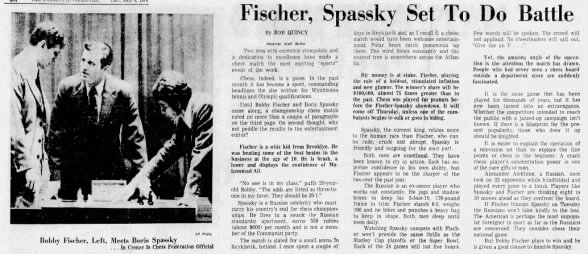 Fischer, Spassky Set To Do Battle 09 Jul 1972, Sun The Charlotte Observer (Charlotte, North Carolina) Newspapers.com
Fischer, Spassky Set To Do Battle 09 Jul 1972, Sun The Charlotte Observer (Charlotte, North Carolina) Newspapers.com
Battle Creek Enquirer Battle Creek, Michigan Sunday, July 09, 1972 - Page 16
Fischer's First Moves
Most everyone is down on Bobby Fischer these days. Chess buffs around the world are impatient with the 29-year-old U.S. grand master for his behavior in demanding more cash before playing the Soviets' Boris Spassky for the world championship. And somehow Fischer's attitude runs counter to the American “for-the-love-of the-game” philosophy of participation in sports.
But there is something to be said on Fischer's side, if not in excuse then at least in explanation.
First, the matter of money. Chess is the way Fischer makes his living, and a player of his stature can't find a paying game every day. He insists, therefore, that the rewards he does receive be commensurate with his considerable genius. And he argues that an American must have such rewards to compete with the likes of Spassky, who can devote full time to chess while living grandly on a state subsidy.
Then there is the matter of ego. Fischer's ([Repetition of Soviet fabrications… labeling a man “temperamental” because he kept the Saturday Sabbath and refused to break it, while in the lead, walked out. Antisemitic news reporters claimed to do so was “Eccentric” & “Controversial” and Sam Reshevsky, an orthodox Jew also was labeled “The Reshevsky Problem” by Soviets. The match was put in Iceland to censor coverage of it. Much and much more, remained untold by author.]) his own denials notwithstanding, are as much a part of the game as the first move of pawn or knight. Chess on the world-championship level is a contest of minds in which some purely psychological advantage can provide the margin of victory. Indeed, Fischer himself has said that he has won a match when he knows his opponent's ego has been crushed.
Although Fischer's idiosyncrasies and mental stratagems are to most a nuisance, they will quickly fade into the background Tuesday, when the match begins. If, that is, it is not delayed again. And the ire so many feel for Fischer will accomplish little but to provide some solace to those of us whose own games will not be studied centuries hence.
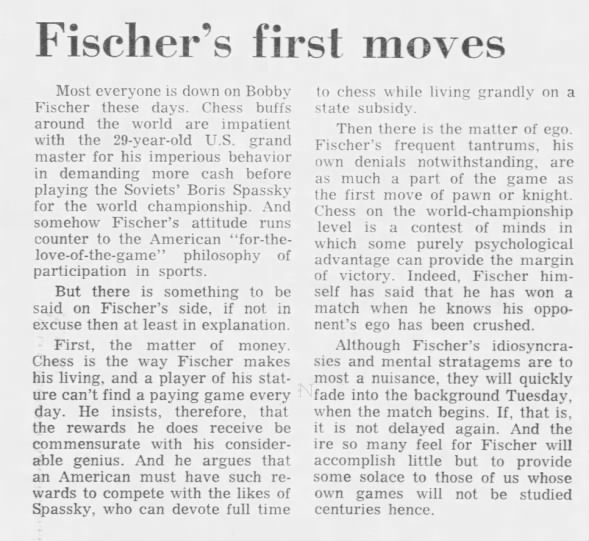 Fischer's First Moves 09 Jul 1972, Sun Battle Creek Enquirer (Battle Creek, Michigan) Newspapers.com
Fischer's First Moves 09 Jul 1972, Sun Battle Creek Enquirer (Battle Creek, Michigan) Newspapers.com
Kingsport Times-News Kingsport, Tennessee Sunday, July 09, 1972 - Page 30
Bobby Fischer A Little Cocky
You have to hand it to Mr. Bobby Fischer. He is the first player of chess who made the headline writers take note of him. He is putting chess on the map and people who do not know a pawn from a bishop or a knight from a castle, are following his career. The Great International Chess Match is getting more build up than the Olympic Games. There has been nothing like it since the days of the heavyweight championship fights.
The Soviets say they are disgusted with Mr. Fischer because he seems to be more interested in money than the love of chess. Well, why not? Who is not interested in money?
Fischer has studied the game of chess to the point where he is almost in a class by himself. It took a lot of work to get where he is and he is entitled to capitalize on his skill. That he is “egotistical” may be part of his technique for getting in the public eye.
If Fischer were a self-effacing individual he would be worth a few paragraphs in the paper and the results of the match with Mr. Spassky of the Soviet Union would be played before a few chessports. His name would go into the record books and be forgotten as are the names of other great chess players.
Now when Fischer comes home, whether he wins or loses his match (assuming that he will play it), he will come home if not exactly like a hero, at least as a celebrity. His interest in money is a guarantee that he will play the match.
And when he comes home he will give interviews and then his managers will arrange a series of public meetings in which Mr. Fischer will demonstrate his wizardry by playing three or four matches with different people all simultaneously. And people with a sudden interest in chess will plunk down the price of a ticket to see him in action. For the American people do love a celebrity.
Then he will make some good arrangements in which he will appear on the air to tell people why he drives only a certain kind of car, or uses only a certain kind of deodorant or eats a certain cereal for breakfast, or uses a certain brand of tablet for a headache or indigestion.
This is just a case of American initiative and taking advantage of opportunity. Kind of an Alger story.
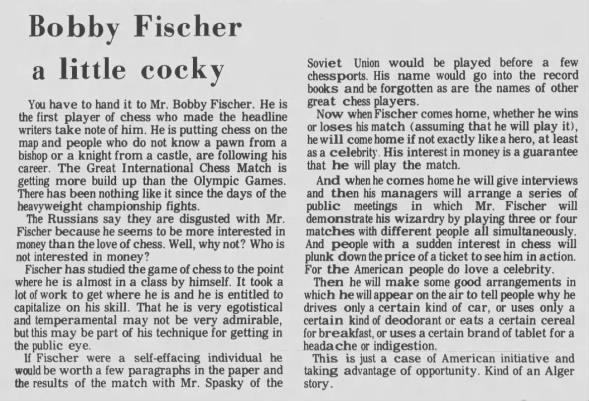 Bobby Fischer A Little Cocky 09 Jul 1972, Sun Kingsport Times-News (Kingsport, Tennessee) Newspapers.com
Bobby Fischer A Little Cocky 09 Jul 1972, Sun Kingsport Times-News (Kingsport, Tennessee) Newspapers.com
The Palm Beach Post West Palm Beach, Florida Sunday, July 09, 1972 - Page 47
Fischer a Bush-League Capitalist by Jim Fiebig
Phoenix — Bobby Fischer's successful demand for higher stakes before agreeing to meet Russia's Boris Spassky for the world champion chess title has Soviet citizens calling him a “money-grubbing capitalist.”
That changes the complexion of the 24-game match.
What originally would have been just another championship series is now an intellectual showdown between Soviet communism and good old American money-grubbing capitalism.
That being the case, the United States is fortunate to have a Fischer to carry its ideological colors. He is more than a phenomenon at chess — he is a phenomenon in a country that ranks the game right up alongside tiddlywinks in national importance.
Put another way, America's coming up with a Bobby Fischer is akin to Japan's chances of producing a world heavyweight boxing champ.
Nevertheless, there is some doubt that Bobby is all that capitalistic. Although his most recent showing is encouraging, he's done little during his career to really make the big buck from the game.
For example, I've never seen a chess set bearing his name. And to my knowledge he has yet to write a syndicated newspaper column on chess tips, appear on Merv Griffin's show or even have his most exciting game plans reduced to comic book form for kids.
Good heavens, there aren't even any Bobby Fischer T-shirts on the market.
If Bobby beats Spassky for the world championship, we can all be quick to call it a triumph for capitalism.
If he loses, however, let's remind the Russians that as a money-grubbing capitalist — Fischer is a bush league amateur.
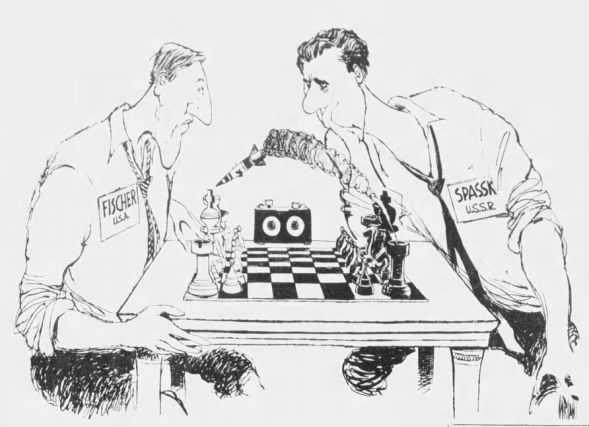
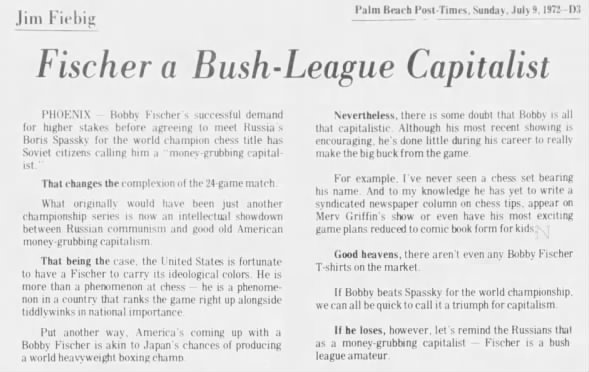 Fischer a Bush-League Capitalist 09 Jul 1972, Sun The Palm Beach Post (West Palm Beach, Florida) Newspapers.com
Fischer a Bush-League Capitalist 09 Jul 1972, Sun The Palm Beach Post (West Palm Beach, Florida) Newspapers.com
The Star Press Muncie, Indiana Sunday, July 09, 1972 - Page 42
Chess Club Members Prove You Got to Work Within the System by Susan Bonnell
Chess is a game with systems of plays and anyone who knows the systems can beat anyone who doesn't know them.
With this basic statement as their assurance the Ball State Chess Club challenged anyone willing to engage in a game of chess on the concourse of the Muncie Mall Saturday and beat almost everyone who took them on.
Their record at the end of 12 hours of chess was better than 115 wins, seven losses and three draws.
THE CLUB set up nine boards on tables loaned by Sears. According to chess club members, the boards were usually in use throughout the day. The club manned the booth with two members on two-hour shifts, though as many as six were on hand to play any of the shoppers who decided to get into the mood for the Fischer-Spassky matches by playing a game or two.
One club member, Homer Peterson, a New Castle resident, stayed at the boards all day, compiling a record of 31 wins and no defeats.
The main purpose of the match, including an exhibition of speed chess by Blaine Newcomb and his younger brother, Murry, was to inform Muncie area residents that there is a local chess club open to anyone, any age who wishes to join.
CLUB MEMBER Philip Newcomb said that though the club is named the Ball State Chess Club it has members of all ages and from Muncie and New Castle.
“The club is part of the United States Chess Federation, one of the groups sponsoring the Fischer-Spassky matches,” Newcomb said. Newcomb is a sophomore at Indiana University this fall.
The club is one of Indiana's most active clubs, sponsoring two major tournaments a year. Weekly attendance at club meeting is usually about 20 persons. The group meets at 3 p.m. every Sunday in Williams Hall at Ball State University.
At their Mall display, club members would often take time to explain to opponents why they had lost the game or if the opponent had been particularly difficult to beat or interested in his game they would urge him to come to their meetings and learn more about the club.
NEWCOMB SAID the club is especially interested in getting more women to join.
“International chess is overwhelmingly male. There's really no reason for it other than women just don't seem to have gotten interested in chess,” he said.
PHOTO CAPTION: 31 WINS, NO LOSSES—Homer Peterson played chess for 12 hours Saturday without finding someone who could beat him. Peterson keeps up a steady stream of talk and motion as he plays, commenting on moves, getting up and visiting with people or simply talking. One of Indiana's U.S. Chess Federation-rated Class A players, Peterson played almost all his games Saturday simultaneously, with two or more boards going at once. (Star Photo by Jerry Joschko)
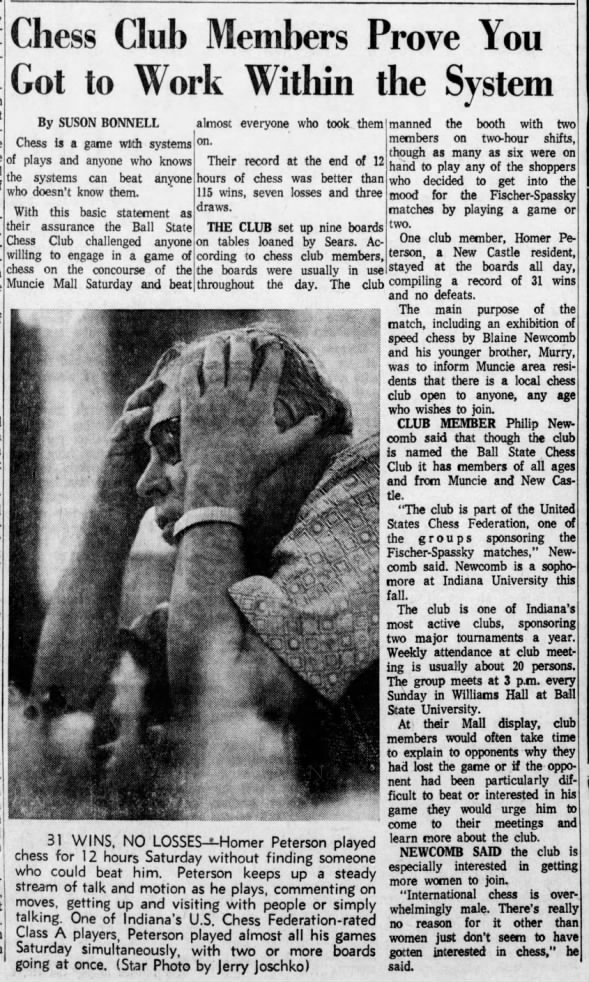 Chess Club Members Prove You Got to Work Within the System 09 Jul 1972, Sun The Star Press (Muncie, Indiana) Newspapers.com
Chess Club Members Prove You Got to Work Within the System 09 Jul 1972, Sun The Star Press (Muncie, Indiana) Newspapers.com
The Observer London, Greater London, England Sunday, July 09, 1972 - Page 40
Masterstroke
Our chess correspondent, Harry Golombek, who has taken over from Dr. Max Euwe the frightful responsibility in Reykjavik for solving any future problems likely to prevent Boris Spassky and Bobby Fischer actually getting to the chess board, was telling us about the status of chess correspondents abroad.
They may not count for much in this country but they get treated like VIPs once they leave it, particularly in Eastern Europe, where there is a proper respect for the rites. Golombek, a modest and disarming man who usually travels about burdened by one of those huge leather brief cases that nobody else has used since the early 1960s, said he is invariably received abroad with formidable protocol and gets privileges usually reserved for a diplomat of the highest rank. In Reykjavik he may have to prove he is one.
Penndennis
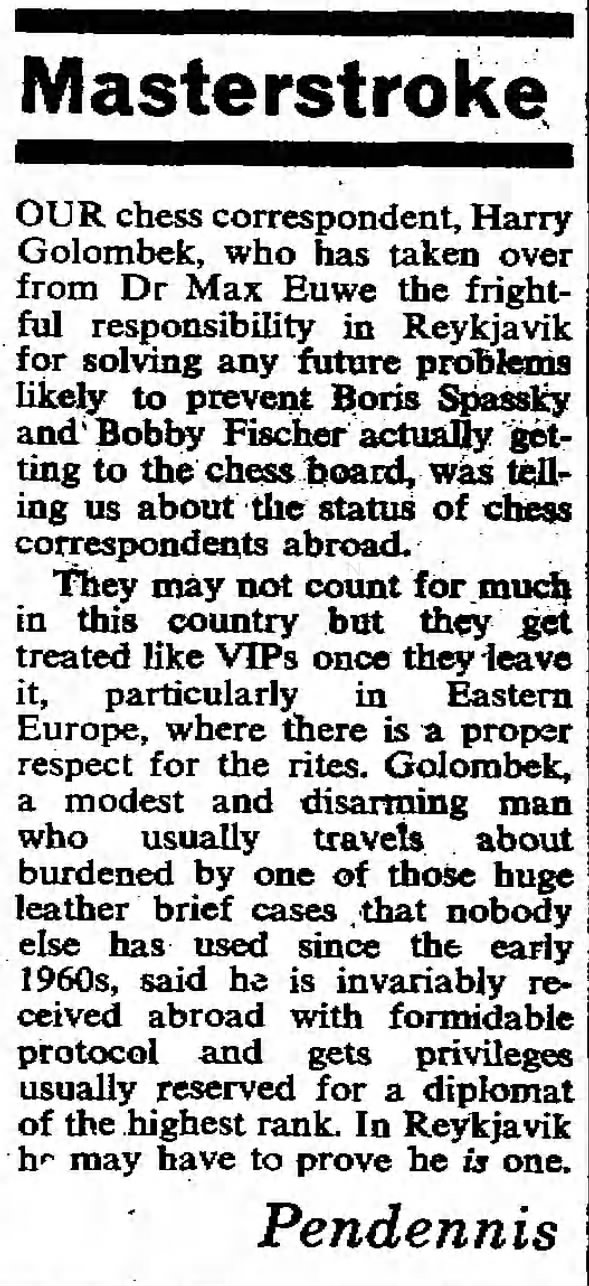 Masterstroke 09 Jul 1972, Sun The Observer (London, Greater London, England) Newspapers.com
Masterstroke 09 Jul 1972, Sun The Observer (London, Greater London, England) Newspapers.com
Newsday (Nassau Edition) Hempstead, New York Sunday, July 09, 1972 - Page 178 — Sports - World Chess Championship — Move-by-move coverage of the competition between Bobby Fischer of the United States and Boris Spassky of Russia, emanating from Iceland. A mock chess board will reflect the play-by-play status of the match, with expert commentary by chess master Shelby Lyman. Extended afternoon coverage will be provided, as well as brief evening wrap-ups. (3 hrs.)
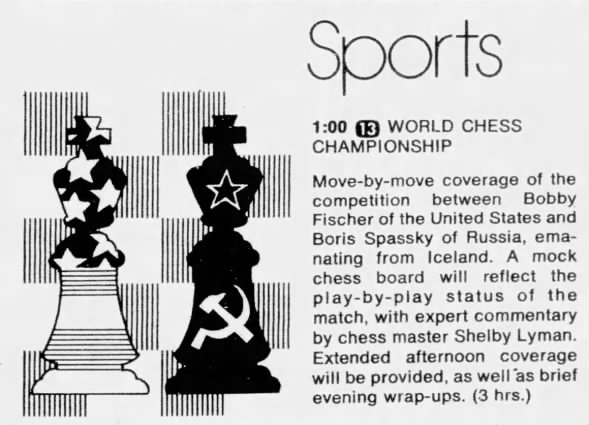 Sports: World Chess Championship 09 Jul 1972, Sun Newsday (Nassau Edition) (Hempstead, New York) Newspapers.com
Sports: World Chess Championship 09 Jul 1972, Sun Newsday (Nassau Edition) (Hempstead, New York) Newspapers.com
The Courier-Journal Louisville, Kentucky Sunday, July 09, 1972 - Page 46
To Russia from America by Merrill Dowden
[Caption: Chess sets have been presented to heads of state from the time of Charlemagne.]
What surely must rate as one of the most exquisite chess sets ever created was presented as a gift of state to the SOVIET people by President and Mrs. Nixon on their recent visit to the USSR.
([But no invitation to a White House Dinner in acknowledgement of Bobby Fischer's triumphant world championship victory and bringing the honor home to the American people was forthcoming from either Nixon or Kissinger, who were more interested in investing in trade relations and profiting from Soviet Slavery and grappling with Xtian Zionist interests ([see Nixon and Kissinger's unsavory conversation, whether its a policy concern or not if Soviets stick Jews in gas chambers recorded in 1973… no friends of the Jews! Since Zionists accused Fischer in the manner of the “Hitlerite Race Myth,” which claims being “born Jewish” which is a fiction, especially since Regina Fischer was not Jewish, she didn't even circumsize her son, which tells the world everything about her view on religion(s)… yet, that Hitler myth persisted and all the more reason Nixon, an antisemite, would snub Fischer and side with his financial/trade partners in Soviet Russia]). Nixon would soon be dealt his own karma, by American demanding the racist traitor's impeachment.])
The inscription reads: “Presented to the people of the Union of Soviet [PSEUDO]Socialist Republics from President and Mrs. Richard Nixon and the people of the United States of America.
Each of the 32 porcelain sculptures, standing six to seven inches in height, is individually fashioned in semi-medieval garb, colored in burgundy and turquoise, and ornamented in 18-carat gold. ([Why didn't Bobby Fischer receive a duplicate of this fine gift, Mr. Nixon, or were your loyalties to the racist Russian empire so much dearer to heart?])
The plumed Knight on horseback is in armor complete with visored headpiece. The Rook was a crenelated tower with a page peering from the top and a court lady in cowled headdress frame in the turret below. ([Describing a fine scene from IMPERIALIST EMPIRES, a thing shared in common between Nixon's role as Emperor elect of the American Empire and the fascist Soviet/Russian Empire.])
The King and Queen are robed in Byzantium splendor; the Queen holds a falcon; the King a pennant of gold. There is a psalter in the Bishop's right hand and in the other a gold crozier. ([Why would any so-called anti-Capitalist, in the Soviet Union, be impressed with such extravagance… such tokens of “aristocracy”?]) The Pawns were embroidered falcons on their jerkins and carry a bow with a quiver and arrows slung around their hips.
Along with the set went a chessboard almost three feet square. It is based on a Fifteenth Century design, and its square are of American black walnut and curly maple. The maple is from a tree in Montgomery County, Pennsylvania, more than 200 years old. The black walnut came from adjoin Bucks county.
Just as baseball is America's national sport, so is chess the national pastime in Russia ([and if Richard Nixon was presenting such a gift to glorify Chess, then he implies his interest in the game and had he really had interest would have promptly extended honors of a White House invitation to the American champion, Robert J. Fischer, who valiantly met the challenge of two months of exhausting mental labors and, won the championship. But the racist, antisemitic traitor Nixon, had no interest in exercising such domestic diplomacy, befitting of our world champion! Nixon was a traitor. That's why he resigned before he was impeached https://constitution.congress.gov/browse/essay/artII-S4-2-3-5/ALDE_00000695/]) And the gift seems doubly appropriate, coming at a time when American grandmaster Bobby Fischer is about to engage world champion Boris Spassky of Moscow in a 24-game title match at Reykjavik, Iceland. ([Except, where was that White House invitation… and how come Brad Darrach/Life Magazine was permitted to get away with publishing false reports, and mocking the lack of invitation from Nixon to Fischer, to the White House? since it was so perfect “for the occasion”. Nixon was a brown-nosing Russian Soviet traitor... and had no intention of supporting our champion. Nixon was a sellout, a traitor to the American nation and its people... to the highest national laws.])
The chess set was designed and executed by the Cybis porcelain art studio in Trenton, N.J., and was many months in the making.
Chess has a long history as a presentation Gift of State. Charlemagne is said to have been the recipient of an elaborately carved set from Empress Irene, who ruled the Eastern Roman Empire (797-802 A.D.) Louis XIV was presented with a magnificent set in 1680. It is now part of a museum collection. ([Indeed, a fine gift from the criminal counterfeit President of the American Empire to his counterparts in the fascist Soviet/Russian Empire.])
Napoleon was given a historic set by Gouvion St.-Cyr, marshal of France. And in 1841 Sir William Parker, admiral of the British fleet that ended the Opium War, was presented a carved ivory set from the collection of the Emperor Tao Kwang (1820-1850).
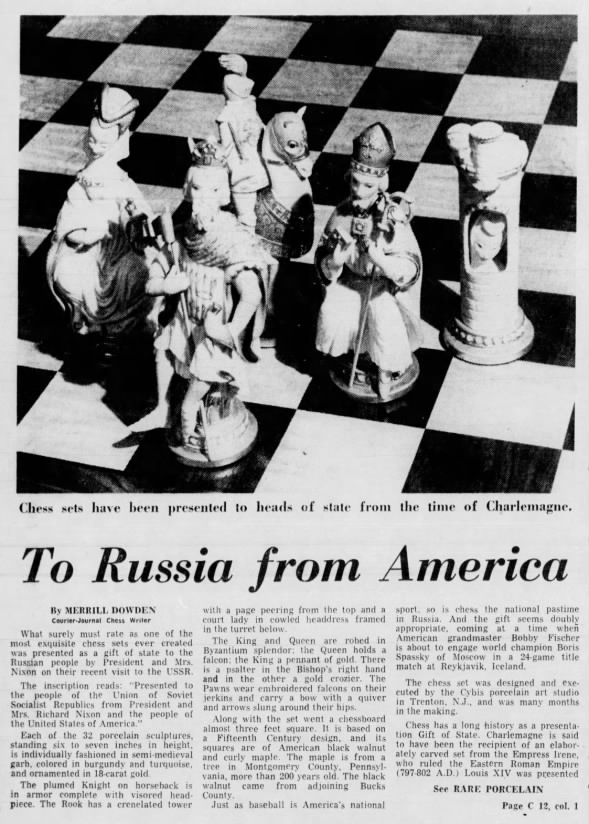 To Russia From America 09 Jul 1972, Sun The Courier-Journal (Louisville, Kentucky) Newspapers.com
To Russia From America 09 Jul 1972, Sun The Courier-Journal (Louisville, Kentucky) Newspapers.com
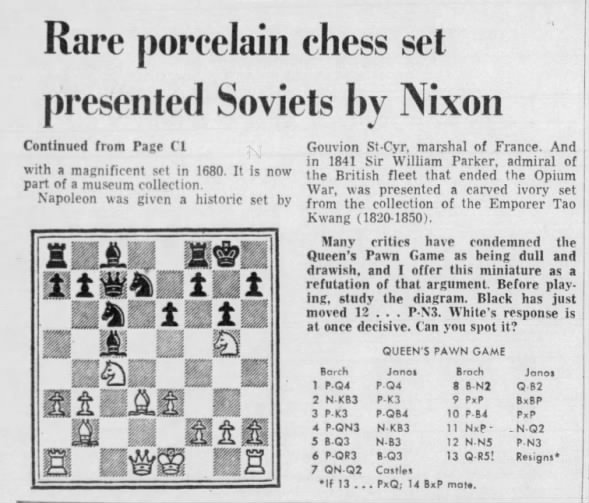 Rare Porcelain Chess Set Presented Soviets by Nixon 09 Jul 1972, Sun The Courier-Journal (Louisville, Kentucky) Newspapers.com
Rare Porcelain Chess Set Presented Soviets by Nixon 09 Jul 1972, Sun The Courier-Journal (Louisville, Kentucky) Newspapers.com
Nixon had no interest in promoting “Peace” in Reykjavik. His extravagant gift to the Soviet tyrants whilst snubbing the American champion, amply demonstrate the side Nixon was on.
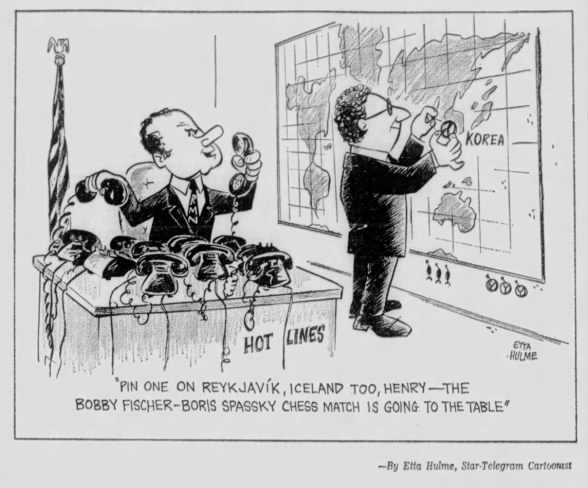 "Pin One on Reykjavik, Iceland Too Henry" (Chess Cartoon) 10 Jul 1972, Mon Fort Worth Star-Telegram (Fort Worth, Texas) Newspapers.com
"Pin One on Reykjavik, Iceland Too Henry" (Chess Cartoon) 10 Jul 1972, Mon Fort Worth Star-Telegram (Fort Worth, Texas) Newspapers.com


























